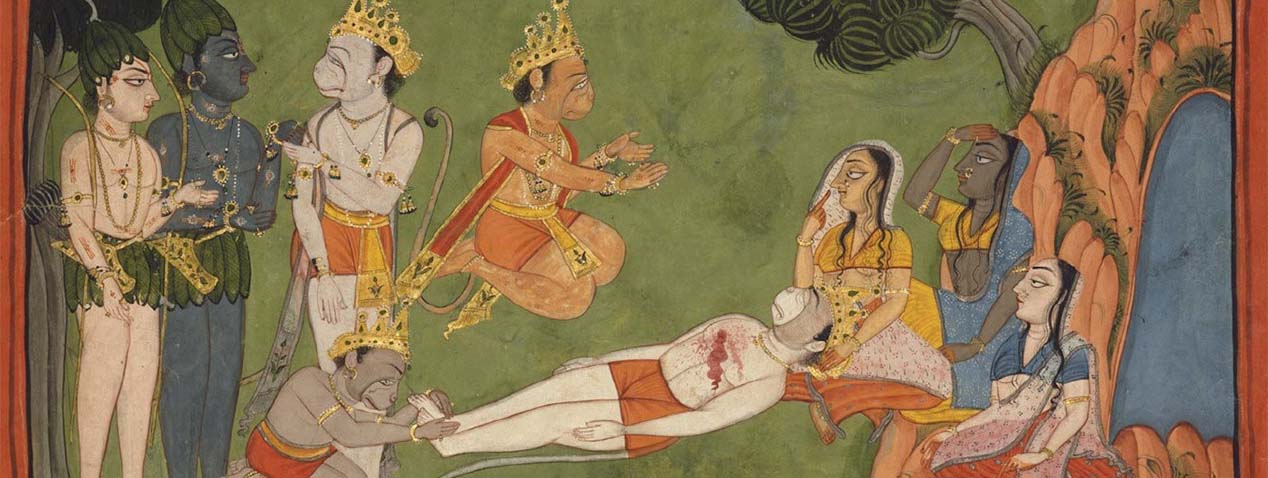Lession 3
Rama Chooses Sides

“Lakshmana had his misgivings. ‘I am not certain whether Sugreeva is trying to involve you in anything more than an ordinary combat between monkeys. I do not know if we should participate in this struggle at all. How can you trust as an ally one who has not hesitated to intrigue fatally against a brother?’” (from Valmiki, trans. R.K. Narayan)
Defining the Dilemma
After Ravana has captured Sita, Rama desperately searches for a way to save her. As he is traveling in the kingdom of Kishkindha, he comes upon Sugreeva, a deposed king of the monkey kingdom, and Hanuman, his general.
Sugreeva explains to Rama that he has been deposed by his ruthless brother, Vali, who has captured his wife and imprisoned his friends. Now, alone and afraid, Sugreeva has been tormented by his brother and the various vanaras that he has sent to kill him. Hanuman assures Rama that Sugreeva is telling the truth. When Sugreeva shows compassion for Rama's loss of his wife, Rama promises to help him defeat his brother.
After this promise is made, Sugreeva continues to explain how he had been deposed by his brother. It seems that Vali, his elder brother, was king when a demon threatened his kingdom. Vali left the palace with Sugreeva at his side, in pursuit of the demon. Realizing that Vali was a formidable opponent, the demon hid in a cave to try to escape the mighty Vali.
At this point, Sugreeva was asked to promise his brother to stay by the door of the cave so that Vali could enter the cave, kill the demon and return to the palace. Sugreeva waited a year, and, when Vali did not return, he assumed that his brother had died. He placed a large bolder in front of the door of the cave and returned to the palace where he took over the throne and ruled as king.
Vali was not dead, however. When he returned, he was angry with his brother for leaving the cave and for usurping his power. He banished him from the kingdom, took Sugreeva's wife for his own, and placed all of Sugreeva's ministers in prison. Sugreeva lives in exile, living in constant fear of his mighty brother's wrath.
Full of confidence for acquiring his new ally, Sugreeva enters the battle with Vali. Vali appears invincible. As Rama watches from behind a tree, Sugreeva pleads with him for assistance. Rama instructs him to wear a garland of flowers around his neck while fighting Vali because they look so much alike to him.
Sugreeva returns to the battle and is eventually overcome by Vali's strength. As Vali holds Sugreeva's neck in his clutches, the younger brother makes a last plea to Rama to save him. Rama shoots his arrow from behind the tree, killing Vali. Sugreeva is returned to the throne, and his army joins Rama's cause.
Outcomes / Consequences
If Lakshmana goes to the aid of his brother, he is forsaking his duty to guard Sita. Yet, Sita swears that she will kill herself if he does not go.
Rama has promised to fight on the side of Sugreeva, but he did so before he knew all of the details of Sugreeva's exile. If he kills Vali, he could be accused of interfering in an affair between brothers.
Sugreeva may not in fact be on the side of righteousness in this scenario, for he has violated his dharma by usurping power from his brother who was still alive and depending on him to be waiting outside the cave.
Vali is a powerful figure, and he has been given a boon by the gods which allows him to drain half the power from his opponents and use it against them. Rama's success in this battle is not guaranteed. If Rama chooses not to kill Vali, he will have broken a promise to a friend.
Rama needs a powerful army to help rescue his missing wife. An alliance with Sugreeva and helping him recapture the throne, would place Sugreeva's powerful army at Rama's disposal, including the resourceful general, Hanuman.
Dharma
According to the rules of dharma, a warrior must first declare himself an enemy of his opponent before entering into battle. Secondly, a warrior's attack must never take place in secret (Rama attacked Vali from a hidden spot behind a tree). Vali, having heard a rumor of Rama's alliance with Sugreeva, tells his wife that Rama is too noble a warrior to enter into this fight without declaring himself.
Vali had committed a sin against his own dharma by capturing his brother's wife and keeping her as his own.
According to the dharma of a king, one may settle disputes within one's territory, even if the disputes exist between brothers, and a king may punish within his own kingdom any one of his subjects who has committed a breach of dharma; however, Rama is not the king of Vali's territory.
A king's dharma includes the power to punish, so long as the punishment is just. Unjust punishments could result in the destruction of the king and his family (Rama and Vali are both kings).
As a warrior, Rama is entitled by dharma to hunt forest creatures (Vali is a monkey).
Questions
Brainstorm and discuss the following questions as they relate to this scene.
- Ask students what current or historical issue illustrates the same type of dilemma.
- Ask students what comparable piece of literature illustrates similar dilemmas.
- What would you have chosen to do if faced with Rama's dilemma?
- What situations have you experienced, or are you aware of, that parallel those in this scene of the Ramayana?
Extensions
- Ask students what current or historical issue illustrates the same type of dilemma.
- Ask students what comparable piece of literature illustrates similar dilemmas.
- If this were to be viewed as a contemporary dilemma, what factors or variables would contribute to the outcome?